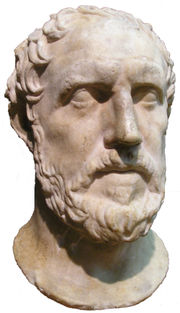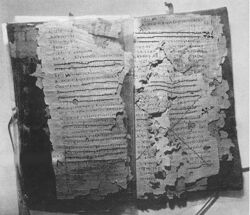Erraticus
“Air-who?”
Marcus Claudius Erraticus (c. 80, 90 or 100 AD -- after 150, 155 or 161) was a Roman historian who started and stopped several books on the founding of Rome, the emperors and moral life. In his extant works, he fluctuates wildly from proud and sexually charged praise of the emperors to bitter condemnation of their clothing, lifestyle and breath. Erraticus also describes several of Caesar's battles as "earth-shattering victories" and "horrific defeats," often in the same sentence.
Erraticus was one of the most prolific authors of his time. Apart from his regular work, he continually published retractions to earlier books, retractions to those retractions and supplements on unrelated subjects. His Life of Trajan went through six revisions, in which Trajan was variously described as a soldier, an emperor, a transvestite comedian, a talking donkey and a meal served inside a peacock.
A Light in the Dark Ages
Due to his high output, many of Erraticus' works survived the fall of the Roman Empire and became the primary source of ancient history in Europe throughout the Middle Ages. When Charlemagne was crowned western emperor in 800, the historian Einhard notes that "following the ancient practice described by Erraticus," Charlemagne poured wine on his feet, spun around three times and jumped on Pope Leo III's shoulders. Erraticus' military writings became popular in the Late Middle Ages; when Charles VII created France's first standing army in the 1440s, he followed Erraticus' text closely and formed his men in divisions of 6,000 men, each wearing a pair of papier-mache breasts.
The recovery of more consistent ancient Roman histories during the Renaissance diminished Erraticus' influence. While he is no longer used as a primary source of Roman history, historians have not made up their minds about his place in literature.
Life, Death and Other
Unlike most ancient writers, Erraticus' works contain a great deal of personal information. Erraticus says he was born in Hippo in North Africa, as well as Jerusalem, Athens and Rome. In his Confessions, he calls his father "a well-honored magistrate" and an "alcoholic juggler." He mentions less about his mother, who died when he was six years old, 11 months prior to his birth.
Following in his father's footsteps, Erraticus took to a life at sea, where he met a rhetoric teacher who either saw promise in the boy or attempted to sell him to the Marcomanni. After a brief public career in which he conquered Germany and ran from battle naked (the exact sequence is unclear), he retired to Rome and began writing books. The exact date of his death is not known, as he claimed that every work of his was his last.
Style
Erraticus writes in a clear Latin style that shows a great deal of influence by Tacitus. Unlike Tacitus, Erraticus avoids conclusions and gets so wrapped up in contradictory evidence that he loses his train of thought. In De Claudio et Nerone, Erraticus writes:
| “ | So at dinner that evening, Claudius was administered poison by his wife Agrippina, but no one agrees how this was done. Some say she placed the fatal mix in his wine; others, that she placed a poisoned feather down his throat as he attempted to clear his system; and still others, that she dressed up a mushroom with the aid of her physician. Mushrooms are very delicious, if prepared properly. I have eaten many of them and never had trouble. Some say that the gods created mushrooms to feed themselves, others, that they . . . | ” |
At this point, the biography of Claudius and Nero turns into a culinary treatise, with no further mention of the emperors.
Erraticus believed his De Natura Vitae (The Meaning of Life) would be his crowning glory.
| “ | Sing to me, oh muse, and let me describe the nature of our lives and their purpose. Unite my thoughts with wisdom, and let me begin my great work, hoping to explain myself to my gods and my neighbors. | ” |
The volume ends there. In a later letter, Erraticus said he abandoned De Natura Vitae after becoming wrapped up in writing a study of sewage, which ran to 30 books.
Erraticus had no clear opinion on the events of his day or Roman government; a letter Erraticus wrote to a pupil describes emperor Antoninus Pius as "the man who restored our liberties, and a cock-sucking liar at that," while his commentary on Suetonius' Lives of Famous Whores (Vitae Praeclarum Luparum) calls the historian "a danger to the morals of Rome who should be deified immediately."
Works
A full list of Erraticus' books would be impossible to run, but his most famous works are:
- De Vita Traian, imperator (The Life of Trajan, emperor) (c.120)
- De Vita Traian, mulier (The Life of Trajan, woman) (c. 122)
- De Retraciones de Nerva (Nerva is a brand of wine) (c. 125)
- Versus alieno Virgil (Virgil was not a Persian) (c.125)
- Haud exspecto sit (No wait, he was) (c.126)
- Sic Transit Gloria Mundi (Run to the hills, the Germans are coming) (c.127)
- Volo ut exsisto Germen (Fuck it, I'd rather be German) (c. 129)
- Deus Beatus Roma (I'm proud to be a Roman, where at least I know I'm free) (c.130)
- De Hadrianus pilosus (On page 12 of my biography of Hadrian, I misstated the length of his hair) (25 books, c. 135)
- De virtutis antiquus (Can't remember what I said about Cincinnatus) (c. 140)
- Summa Libri (Started as a compendium of all knowledge; became a to-do list for his villa) (c.149)
- Europa Ceterum Orbis Postmodo Futuet (Europe Will Fuck Up The World When We're Gone) (c.150)
- De Cataclismis (On Douchebags) (c.124)
- De Maximitate Mammae (On The Size of Breasts) (c.Puberty)
| Featured version: 16 February 2007 | |
| This article has been featured on the main page. — You can vote for or nominate your favourite articles at Uncyclopedia:VFH. | |


